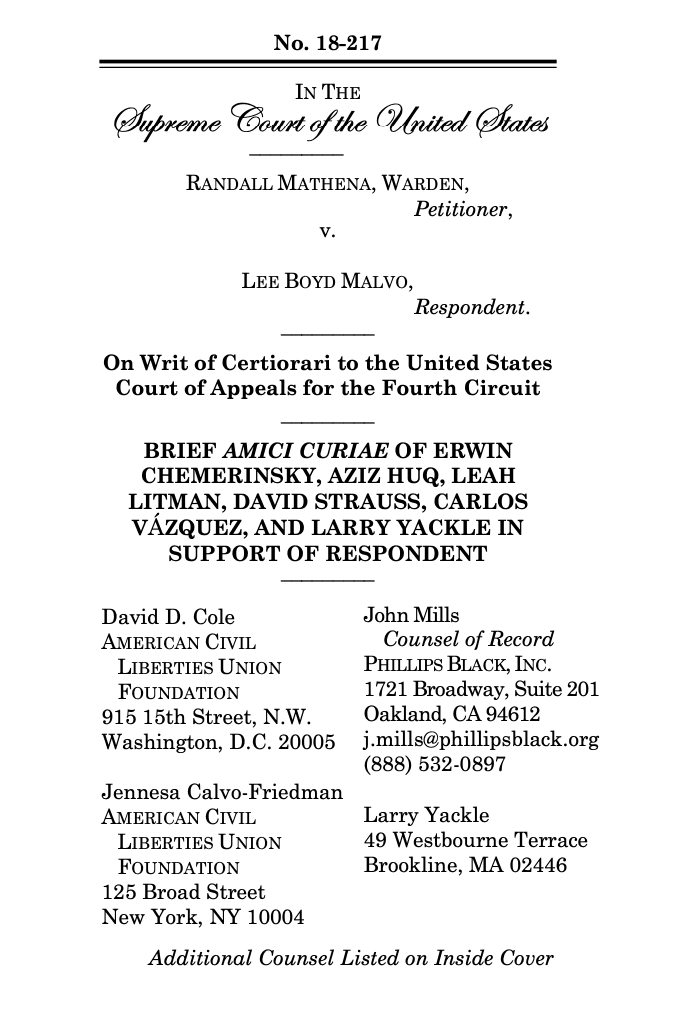
Summary of Argument
This case concerns the scope of the constitutional rule announced in Miller v. Alabama, 567 U.S. 460 (2012), and held applicable on collateral review in Montgomery v. Louisiana, 136 S. Ct. 718 (2016). Respondent Lee Boyd Malvo, who was sentenced to life without parole for crimes committed as a juvenile, maintains that Miller established a substantive rule that renders life without parole disproportionate for the vast majority of juveniles in light of their “diminished culpability and heightened capacity for change,” and that he is therefore entitled to a new sentencing proceeding at which his youth will be considered to implement that substantive rule. Miller, 567 U.S. at 479. The substantive character of this rule is precisely why this Court in Montgomery held the Miller rule applied on collateral review under the retroactivity rules set forth in Teague v. Lane, 489 U.S. 288, 307, 311 (1989), and its progeny.
To conform to Miller, a sentencing scheme must require the sentencing authority to separate juveniles in the class who cannot be subjected to life without parole (juveniles whose crimes reflect “transient immaturity”) from the rare juveniles who fall outside that class (those whose crimes reflect “irreparable corruption”) and who may therefore receive that sentence. Miller, 567 U.S. at 479-80 (quoting Roper v. Simmons, 543 U.S. 551, 573 (2005)). Because Virginia’s sentencing scheme offered no assurance that life without parole would be imposed only on the rare irreparably corrupt juveniles, Malvo’s sentence is unconstitutional.
The argument advanced by the warden and the United States as amicus treats Miller as applying only to “mandatory” life-without-parole sentences. They maintain that any discretion at all to impose a lesser sentence automatically takes a sentencing scheme outside Miller’s strictures. But that position fails to account for Miller’s reasoning or Montgomery’s holding that Miller is substantive precisely because it identifies a class of juveniles whom the state cannot condemn to life without parole. If all Miller required was a discretionary rather than a mandatory process, it would be a procedural rule, and likely would not have been given retroactive effect by Montgomery.
The warden’s view misunderstands not just Miller and Montgomery, but the very concept of a substantive rule set forth by Teague and its progeny. Teague established that most new constitutional rules are not applicable on collateral review, i.e. after a criminal conviction has been rendered final through direct appeal. 489 U.S. at 307, 311. But it recognized two exceptions to that general rule: (1) for “watershed” procedural rules; and (2) for “substantive” rules, including those that place certain penalties beyond the state’s power to impose, because of either the nature of the offense or the offender. Id. at 311. Montgomery properly held that Miller announced a substantive rule, and therefore is applicable on collateral review.
The argument advanced by the warden and the United States cannot be squared with the distinction between substantive and procedural rules. This Court’s precedents treat a rule as substantive, and therefore applicable to collateral proceedings regardless of when a conviction became final, where it prohibits the imposition of a particular punishment on a category of offenders. See Schriro v. Summerlin, 542 U.S. 348, 352 (2004). Montgomery held that the rule announced in Miller was substantive because it prohibits a life-without-parole sentence for a class of offenders (juveniles) and allows it only in aberrant cases of “the rare juvenile offender whose crime reflects irreparable corruption.” Montgomery, 136 S. Ct. at 734 (quoting Miller, 567 U.S. at 479-80).
The framework under which Malvo was sentenced does not ensure that the sentencing authority performs the necessary sorting function. Virginia’s applicable statutes make no distinctions between juveniles and adults, let alone between those juveniles who can and cannot be sentenced to life without parole. The warden nonetheless contends that the trial court could have considered Malvo’s youth and related factors if Malvo had requested that the court suspend his sentence.
This argument fails. It distorts the purpose of a proceeding on the propriety of suspending a sentence, and, most important, it misses the point of the sentencing hearing that Miller demands. The salient objective of the hearing that comports with Miller is to isolate the exceedingly rare juvenile who is “permanently incorrigible” from the class of juvenile offenders who cannot constitutionally be given a life-without-parole sentence. The warden makes no assertion that the sentencing judge in fact engaged in the sorting required by Miller; he apparently argues that it is sufficient that it could have happened, even if it never did. The mere formal availability of suspension in no way assures that that determination was made in Malvo’s case.